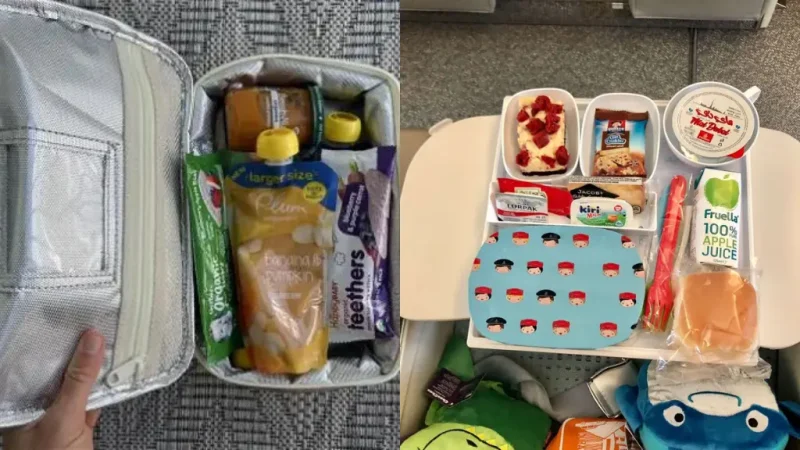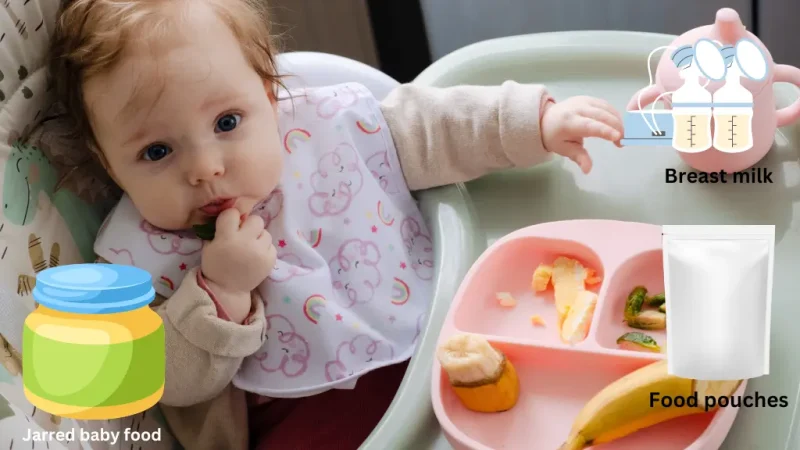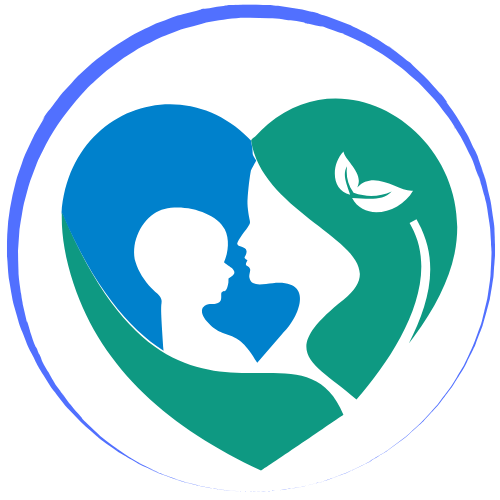Can You Bring Baby Food On A Plane? This is a common concern for parents planning air travel with their little ones. Navigating the rules and regulations can seem daunting, but ensuring a smooth journey is crucial.
Yes, you can bring baby food on a plane. The Transportation Security Administration (TSA) has specific guidelines that allow parents to carry baby food, formula, and breast milk through security checkpoints.

This article will explore TSA regulations, packing tips, and other essential information to help you travel confidently with baby food.
Can You Bring Baby Food On A Plane?
Wondering if you can pack those essential purees and formula for your little one’s flight? Good news for traveling parents!
You can bring reasonable quantities of baby food on a plane in your carry-on or checked bag. This means you don’t have to stress about your baby going hungry during the journey.
The Transportation Security Administration (TSA) understands babies’ special dietary needs and prohibits liquid food, formula, and breast milk restrictions.
So pack those jars, pouches, and bottles – your baby’s meals are cleared for takeoff!
Bringing Child Food on a Plane: What You Need to Know
Traveling with a baby can feel like packing for a small army, right? But you can breathe a sigh of relief when it comes to food.
Airlines and security agencies understand that babies have special needs, and they’ve made provisions to ensure your little one doesn’t go hungry mid-flight.
TSA Regulations for Baby Food: The Basics
Let’s start with the good news: The Transportation Security Administration (TSA) allows parents to bring a “reasonable amount” of baby food through security checkpoints.
But what does “reasonable” mean? It’s enough to get you through your travel day and potential delays. So don’t worry, you won’t have to ration out those pureed peas!
Here’s a quick rundown of what’s allowed:
- Baby food in jars or pouches
- Liquid formula
- Breast milk
- Juice
- Water for mixing formula
The best part? These items are exempt from the usual 3-1-1 liquids rule. You can bring more than 3.4 ounces (100 milliliters) of these items in your carry-on bag. How’s that for a parent-friendly policy?
Types of Baby Food Allowed: Options Galore!
When it comes to the types of baby food you can bring, you’ve got plenty of choices. Here’s a breakdown:

- Jarred baby food: Those little glass jars of pureed goodness are perfectly fine to bring along.
- Food pouches: These convenient squeeze packets are a traveler’s best friend.
- Homemade baby food: Yes, you can bring your creations! Just make sure they’re in a sealed container.
- Liquid formula: Ready-to-feed formula is allowed in reasonable quantities.
- Powdered formula: This is a great space-saving option.
- Breast milk: Whether fresh or frozen, you can bring as much as you need.
Packing Tips for Baby Food: Stay Organized and Stress-Free
Now that you know what you can bring, let’s discuss how to pack it. Here are some tips to keep you organized:
- Use clear, resealable bags: This makes it easy for security to inspect your items without making a mess.
- Pack a separate bag: Keep all your baby food items in a dedicated bag for easy access.
- Bring ice packs: If you need to keep anything cold, gel ice packs are allowed through security.
- Don’t forget utensils: Pack some baby-friendly spoons and forks.
- Include extras: Always pack more than you think you’ll need. Delays happen!
Security Screening Process: What to Expect
Ah, the security checkpoint. It can be daunting, but you’ll breeze right through with a little knowledge.
What to Expect at the Checkpoint?
When you reach the security checkpoint, here’s what typically happens:
- Inform the TSA officer that you’re traveling with baby food.
- Remove your baby food items from your carry-on bag.
- Place them in a separate bin for X-ray screening.
- Be prepared for additional screening if requested.
Remember, the TSA officers are there to help ensure everyone’s safety. They’re not out to make your life difficult, I promise!
Tips for a Smooth Screening Experience
Want to glide through security like a pro? Try these tips:
- Be organized: Have your baby food items easily accessible.
- Stay calm: Your little one can sense your stress, so take a deep breath and smile.
- Be patient: Additional screening might take a few extra minutes, but it’s for everyone’s safety.
- Know your rights: You can bring these items, so don’t let anyone tell you otherwise.
Dealing with Additional Inspections
Sometimes, the TSA might need to look closer at your baby’s food. Don’t panic! Here’s what might happen:
- Visual inspection: They might ask you to open containers.
- X-ray screening: Your items will go through the X-ray machine.
- Explosive trace detection: They might swab the outside of containers.
Remember, you can request that your breast milk or formula not be X-rayed or opened. In this case, alternative screening procedures will be used.
Airline Policies: Know Before You Go
While TSA regulations apply to all U.S. airports, individual airlines might have their policies. It’s always a good idea to check with your specific airline before you fly.
Most are very accommodating regarding baby food, but double-checking never hurts.
Here’s a handy table summarizing some major U.S. airlines’ policies:
| Airline | Baby Food Policy |
|---|---|
| American Airlines | Allows baby food in reasonable quantities |
| Delta | Permits baby food, formula, and breast milk |
| United | Allows baby food and formula in carry-on bags |
| Southwest | Permits baby food and formula in reasonable amounts |
International Travel Considerations: A World of Differences
Things can get more complicated if you’re jetting off to international destinations. Different countries have different rules, so doing your homework before you travel is crucial.
Researching Country-Specific Regulations
Before you pack your bags, take some time to research the regulations of your destination country. Some things to look out for:
- Restrictions on bringing in certain foods
- Customs declaration requirements
- Specific packaging or labeling rules
Navigating Foreign Airports
When you’re in a foreign airport, things might work a little differently. Here are some tips:
- Allow extra time: Security procedures might take longer in unfamiliar airports.
- Learn key phrases: Knowing how to say “baby food” in the local language can be helpful.
- Be flexible: Rules might be interpreted differently, so stay calm and follow the flow.
Traveling with Special Dietary Needs: When Your Little One Has Unique Requirements
Traveling can be extra stressful if your baby has allergies or special dietary needs. But don’t worry—with a little preparation, you’ve got this!
Packing for Allergies
If your baby has food allergies, here are some tips:
- Bring a doctor’s note: This can be helpful if you’re questioned about special foods.
- Pack extra: Bring more special food than you think you’ll need.
- Label everything: Clearly mark all food items with your child’s name and any allergy information.
Dealing with Special Formulas
If your baby needs a special formula, consider these tips:
- Contact the airline: Let them know about your needs in advance.
- Bring the original packaging: This helps prove the medical necessity of the item.
- Pack a cooler: If the formula needs to be kept cold, a small cooler with ice packs is allowed.
Tips for a Stress-Free Travel Experience: Making Memories, Not Headaches
Now that we’ve covered the details let’s discuss how to make your travel experience as smooth as possible. After all, this trip is about making memories with your little one, not stressing about baby food!
Before You Leave
- Make a checklist: Write down everything you need to pack for feeding your baby.
- Pack smart: Use cubes or clear bags to organize baby food items.
- Plan your meals: Think about when your baby will need to eat during the journey.
At the Airport
- Arrive early: Give yourself plenty of time to get through security.
- Stay hydrated: Remember to drink water yourself – a hydrated parent is happy!
- Find a quiet spot: Look for family lounges or quiet corners for feeding time.
On the Plane
- Time it right: Try to feed your baby during takeoff and landing to help with ear pressure.
- Be prepared for messes: Pack extra wipes and a change of clothes (for baby and you!).
- Ask for help: Flight attendants are often more than willing to lend a hand.
Conclusion: You’ve Got This, Super Parent!
So, can you bring baby food on a plane? Absolutely! With some preparation and knowledge, you can ensure your little one stays well-fed and happy throughout your journey. Remember, the key points are:
- You can bring baby food, formula, and breast milk in reasonable quantities.
- These items are exempt from the usual liquids restrictions.
- Be prepared for additional screening at security.
- Check with your airline for any specific policies.
- For international travel, research your destination’s regulations.
Traveling with a baby might seem daunting, but with these tips in your back pocket, you’re ready to take on the world.
So pack those bags, grab your little one, and prepare for an adventure. After all, the family that travels together grows together. Happy travels, super parent!

1 thought on “Can You Bring Baby Food On A Plane? A Parent’s Ultimate Guide to Hassle-Free Travel”